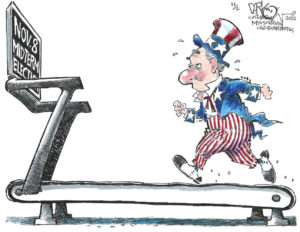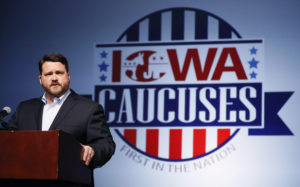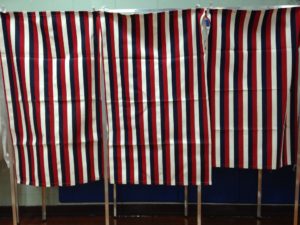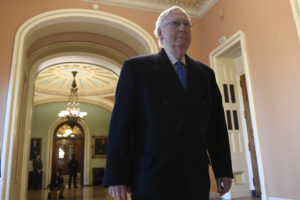High Time for Voting Reform
Instead of handicapping a presidential contest almost two years away, we should focus on improving our handicapped voting machines.WASHINGTON — For those who despair that it’s way too early to start thinking about the 2008 presidential election — and who doesn’t? — there is a more productive way to spend political effort: Start working to ensure that the vote goes better in 2008 than it has in any election since the catastrophe of 2000.
Save for a single Florida congressional district — the one previously held, fittingly enough, by Katherine Harris — the 2006 congressional elections produced clear winners and losers, with relatively few allegations that machine malfunctions or partisan malfeasance changed the outcome. But that doesn’t mean there weren’t machine malfunctions, partisan malfeasance — and a certain chaotic quality to whole affair.
Touch-screen machines mysterious flipped voters’ choices or failed to record them at all, cards to activate the computers went missing, poll workers sometimes didn’t even know how to turn machines on. New identification requirements, and poll workers’ confused interpretations of them, vexed hundreds of would-be voters — including Rep. Steve Chabot, R-Ohio, who was turned away from the polls until he returned with identification bearing his home address.
“Around the country, the individual voting experience didn’t go well,” says Doug Chapin, director of electionline.org, a nonpartisan organization that tracks the performance of the voting system.
Help is on the way — from Florida, of all places.
Gov. Charlie Crist has proposed a $32.5-million plan to rid the state of the troublesome touch-screen voting systems its counties bought just a few short years ago. The machines once were billed as the solution to the horror of the hanging chad. They’ve turned out instead to be a horrific reminder that computers can, and sometimes do, malfunction; that they perform only as well as the people entrusted to operate them; and that the same doubts about security that make us think twice before feeding our credit card numbers into computers should make us think twice before entering our votes that way.
The dispute over the outcome in Florida’s 13th Congressional District centers on 18,000 voters in Sarasota County who used touch-screen machines but whose votes weren’t recorded in the race for Congress. Republican Vern Buchanan was certified the winner over Democrat Christine Jennings by a margin of just 369 votes.
Crist wants the touch-screen machines replaced by optical-scan devices — on which a voter records his or her choice by penciling in a circle, with the card then fed into a computer to be tallied — because that system provides a document that would be preserved for audits or recounts. The governor wants the new systems in place by November 2008, lest Florida again become the national poster child for electoral meltdown.
If Crist succeeds, he’ll deserve thanks just for letting us all set our sights on snafus and skullduggery in some other, yet-to-be-named state. Actually, he already deserves a pat on the back for a greater service. As the first leading Republican to take voting-system problems seriously, Crist may have begun to drain the toxic partisanship from the issue.
Since the debacle of 2000, Republicans as a group have determinedly scoffed at the idea that something is terribly wrong with our voting system. To acknowledge the obvious would be to cast doubt on the legitimacy of George W. Bush’s ascension to the presidency. Democrats climbed aboard the voting-reform bandwagon to do just that.
How stupid is this impasse? Rep. Rush Holt, D-N.J., first introduced legislation in 2003 to require all voting systems across the country to have a paper trail. By the end of the last congressional session — even with a majority of the House, including several Republicans, as co-sponsors — Holt’s proposal never was granted a hearing. He has reintroduced it now with Democrats in control of both chambers.
Machines aren’t the only problem with American elections — registration is typically cumbersome and the rules prone to partisan manipulation, new identification requirements in many states seem to be aimed more at keeping minority voters from the ballot box than preventing rare cases of voter fraud. In too many states, partisan officials decide pivotal election questions — there’s a whole new cast of Katherine Harrises waiting in the wings. Congress should at least ban elections administrators from actively campaigning for a political candidate.
With the 2008 campaign under way and so much needed reform undone, there would be no better way to usher out the Bush era than to usher in safeguards against the scandalous failures of the voting system that his election so thoroughly exposed.
Marie Cocco’s e-mail address is mariecocco(at symbol)washpost.com.
Your support matters…Independent journalism is under threat and overshadowed by heavily funded mainstream media.
You can help level the playing field. Become a member.
Your tax-deductible contribution keeps us digging beneath the headlines to give you thought-provoking, investigative reporting and analysis that unearths what's really happening- without compromise.
Give today to support our courageous, independent journalists.






You need to be a supporter to comment.
There are currently no responses to this article.
Be the first to respond.